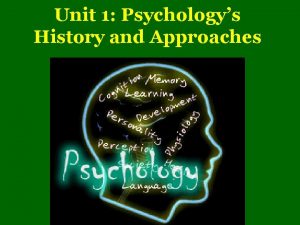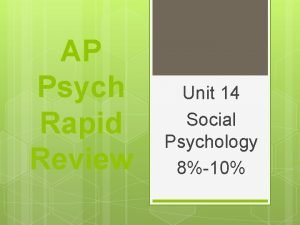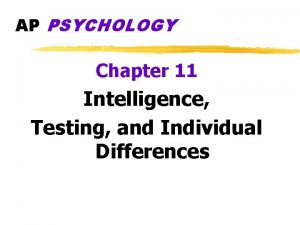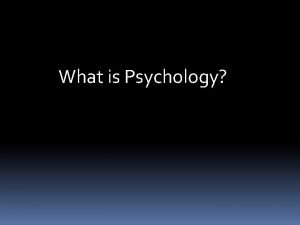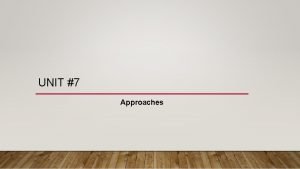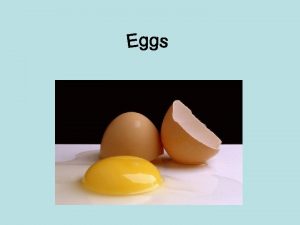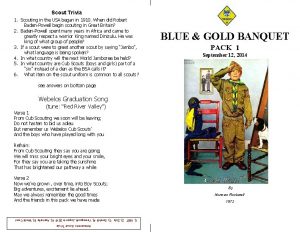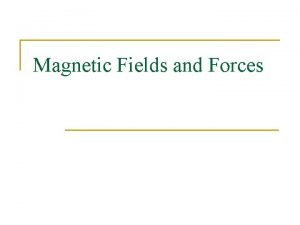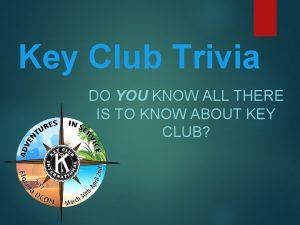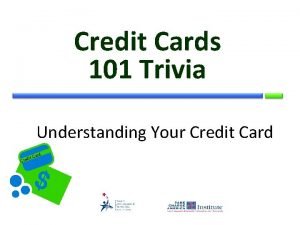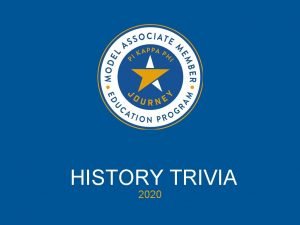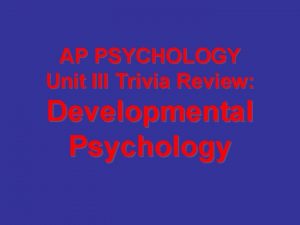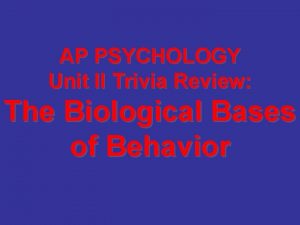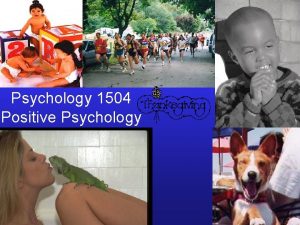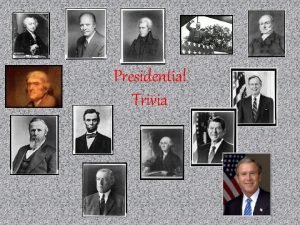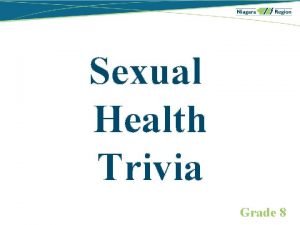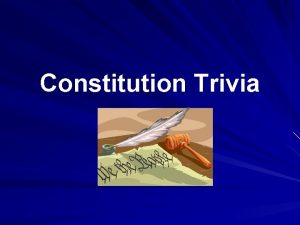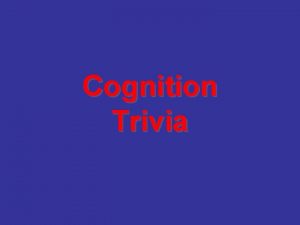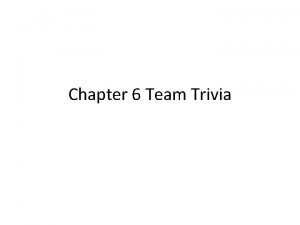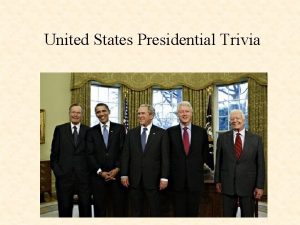AP PSYCHOLOGY Unit I Trivia Review History Approaches


























- Slides: 26

AP PSYCHOLOGY Unit I Trivia Review: History, Approaches & Research Methods

Round 1: The History of Psychology

Round 1: Question 1 • QUESTION: In 1879, this man, determined to make psychology its own academic disciple, established the first psychological laboratory in Leipzig, Germany. • ANSWER: Wilhelm Wundt (the “father” of psychology)

Round 1: Question 2 • QUESTION: Which of the major historical approaches to psychology would agree with the following statement: “the melody of a song is greater than its individual notes…” • ANSWER: Gestalt Psychology (top-down processing; Max Wertheimer; “the whole is greater than the sum of its parts…”)

Round 1: Question 3 • QUESTION: The idea of “tabula rasa” as proposed by philosophers such as Aristotle and John Locke demonstrates what major issue in the modern psychological community? • ANSWER: Nature v. nurture

Round 1: Question 3 • QUESTION: Which of the major historical approaches to psychology was most concerned with the mind’s ability to adapt to its environment/surroundings? • ANSWER: Functionalism (founder – William James)

Round 1: Question 5 • QUESTION: In which setting do the majority of modern psychologists work? • ANSWER: Colleges & universities (approximately 35%)

Round 2: Major Schools of Thought

Round 2: Question 1 • QUESTION: Why did John Watson object to Sigmund Freud & his interest in the psychodynamic approach to psychology? • ANSWER: Watson disliked the fact that Freud attributed human behaviors to the unconscious mind – an unobservable element of the human mind; Watson believed that psychology should be the

Round 2: Question 2 • QUESTION: A psychologist that studies the impact of hormones on postmenopausal women is most likely using the ____ approach of psychology. • ANSWER: Biological/Biopsychology (also referred to as neuroscience)

Round 2: Question 3 • QUESTION: The development of humanistic psychology during the 1960 s is often attributed to this man. • ANSWER: Abraham Maslow (Carl Rogers was another pioneer in this movement)

Round 2: Question 4 • QUESTION: Gestalt psychology was most influential to the development of which modern school of psychological thought? • ANSWER: Cognitive psychology (developed during the 1950 s; the “cognitive revolution”; led by psychologist George Miller)

Round 2: Question 5 • QUESTION: What type of psychologist would be most likely to treat a paranoid schizophrenic who frequently experiences delusions and hallucinations? • ANSWER: Clinical psychologist (treat more severe problems, as opposed to counseling psychologists)

Round 3: Research Methods

Round 3: Question 1 • QUESTION: According to psychologists, what are the primary goals of psychological research? • ANSWER: (1) Measurement/Description (2) Understanding/Prediction (3) Application/Control

Round 3: Question 2 • QUESTION: Explain the difference between random sampling and random assignment. • ANSWER: Random sampling happens prior to the experiment in order to ensure a representative sample; random assignment is the method in which researchers assign participants to either the control group or the experimental

Round 3: Question 3 • QUESTION: Explain the relationship between the independent variable and the dependent variable in an experiment. • ANSWER: In an experimental group, the independent variable is thought to impact or change the dependent variable. . .

Round 3: Question 4 • QUESTION: In order for an experimental variable to be considered “measurable” researchers must first establish a(n) _____. • ANSWER: Operational definition

Round 3: Question 5 • QUESTION: How does a single-blind study differ from a double-blind study? • ANSWER: Single-blind – subjects are in the dark, prevents the placebo effect; Double-blind – both subjects and researchers are in the dark, prevents the placebo effect & the experimenter effect.

Round 4: Psychological Statistics

Round 4: Question 1 • QUESTION: What is the best measure of central tendency in the presence of a skewed distribution? • ANSWER: Median

Round 4: Question 2 • QUESTION: What two elements of a correlational relationship do correlation coefficients (r) demonstrate? • ANSWER: Strength of relationship & direction of relationship.

Round 4: Question 3 • QUESTION: Explain how one would interpret a p-value of 0. 15. • ANSWER: The data is NOT statistically significant; the probability that the results were due to chance was 15 times out of 100.

Round 4: Question 4 • QUESTION: Provide an example of both a positive correlation and a negative correlation. • ANSWER: Positive – as alcohol consumption increases, the likelihood of DUI increases; Negative – as levels of activity increase, the likelihood of heart attack decreases

Round 4: Question 5 • QUESTION: Explain the bell curve in terms of its standard deviations. • ANSWER: 68. 3% of the population falls within one SD in either direction; 95. 4% of the population falls within two SDs in either direction; 99. 7% of the population falls within three SDs in either direction…

BONUS ROUND • QUESTION: According to the APA, there are 5 major ethical considerations when conducting psychological research. What are they? • ANSWER: (1) Voluntary/informed consent (2) No physical/psychological harm (3) Deception only if debriefed (4) Privacy rights (5) Animal harm acceptable if…
 Unit 1 psychology's history and approaches
Unit 1 psychology's history and approaches Unit 6 review questions
Unit 6 review questions Ap psychology unit 14 review
Ap psychology unit 14 review Ap psychology unit 11 practice test
Ap psychology unit 11 practice test Unit 1 test review us history
Unit 1 test review us history Approaches to psychology
Approaches to psychology The 7 approaches to psychology
The 7 approaches to psychology Structuralism vs functionalism psychology
Structuralism vs functionalism psychology Module 2 today's psychology and its approaches
Module 2 today's psychology and its approaches Graphic organizer activity 1 approaches to psychology
Graphic organizer activity 1 approaches to psychology Carl rogers humanistic theory
Carl rogers humanistic theory Psychology perspectives
Psychology perspectives Algebra 2 unit 1 test answers
Algebra 2 unit 1 test answers Camping trivia
Camping trivia Warm up questions
Warm up questions Trivia night rules
Trivia night rules The function of egg
The function of egg Hunger games trivia questions
Hunger games trivia questions How much hellstone for a full set
How much hellstone for a full set Boy scout trivia questions
Boy scout trivia questions Moana trivia
Moana trivia Health and wellness trivia
Health and wellness trivia Facts about magnetism
Facts about magnetism Cybersecurity trivia
Cybersecurity trivia Key club trivia
Key club trivia Credit card trivia
Credit card trivia Cub scout trivia facts
Cub scout trivia facts
